Persisting Issues Related to the Policy of National Malaria Drug
Added on 2022-08-28
29 Pages4352 Words17 Views
Running head: MANAGEMENT
MANAGEMENT
Student’s Name
University Name
Author note
MANAGEMENT
Student’s Name
University Name
Author note
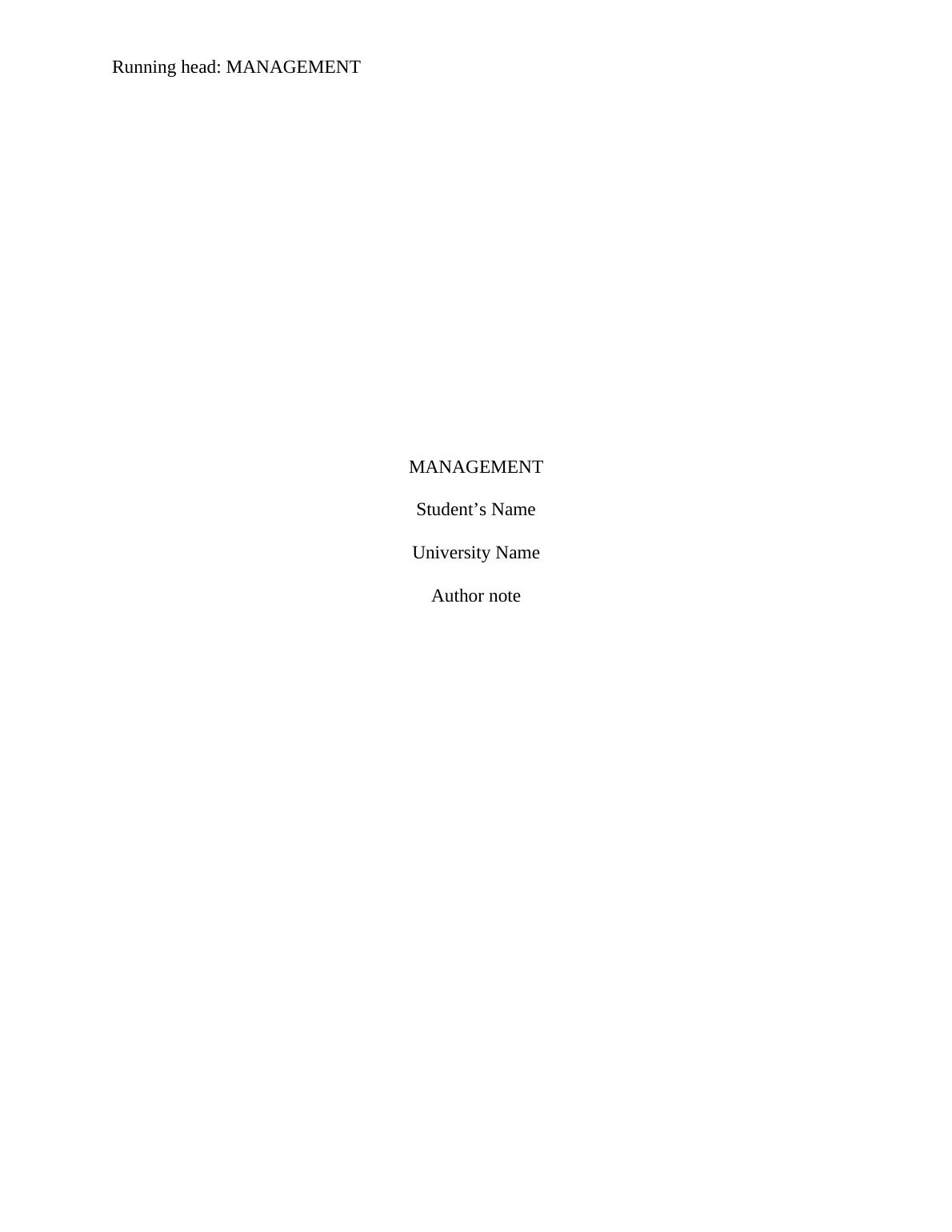
1
MANAGEMENT
Executive summary
Problem statement - Malaria has been one of the continuing causes of death in vulnerable groups
such as women and children in Saudi Arabia. This major health challenge is being faced in
countries with regular transmission. While several programs and research agenda have been
promoted to eliminate malaria in order to reduce the burden of malaria, the mortality rate of
malaria infectants has not decreased.
Methods - This research study adopted the survey approach for the collection of information
over the behavior and attitude of population towards a global epidemic of malaria and its
remedies. Both primary and secondary data has been collected for this research. Case study
approach has also been considered for analysis of this research project.
Results - The results of the survey revealed that majority of the population in the country are
infected by this global disease due to the imported malaria from the workers from republic of
Yemen and pilgrims who visit the country. The results targeted the fact that travelers coming
from malaria-endemic areas are transmitting the disease majorly to the elderly and the children
below 5 years.
Conclusion – Changes are required in the current National malaria drug policy for combating the
sources of imported malaria in the country. The paper recommends framework for effective
identification and treatment of imported malaria and its transmission in the country.
MANAGEMENT
Executive summary
Problem statement - Malaria has been one of the continuing causes of death in vulnerable groups
such as women and children in Saudi Arabia. This major health challenge is being faced in
countries with regular transmission. While several programs and research agenda have been
promoted to eliminate malaria in order to reduce the burden of malaria, the mortality rate of
malaria infectants has not decreased.
Methods - This research study adopted the survey approach for the collection of information
over the behavior and attitude of population towards a global epidemic of malaria and its
remedies. Both primary and secondary data has been collected for this research. Case study
approach has also been considered for analysis of this research project.
Results - The results of the survey revealed that majority of the population in the country are
infected by this global disease due to the imported malaria from the workers from republic of
Yemen and pilgrims who visit the country. The results targeted the fact that travelers coming
from malaria-endemic areas are transmitting the disease majorly to the elderly and the children
below 5 years.
Conclusion – Changes are required in the current National malaria drug policy for combating the
sources of imported malaria in the country. The paper recommends framework for effective
identification and treatment of imported malaria and its transmission in the country.
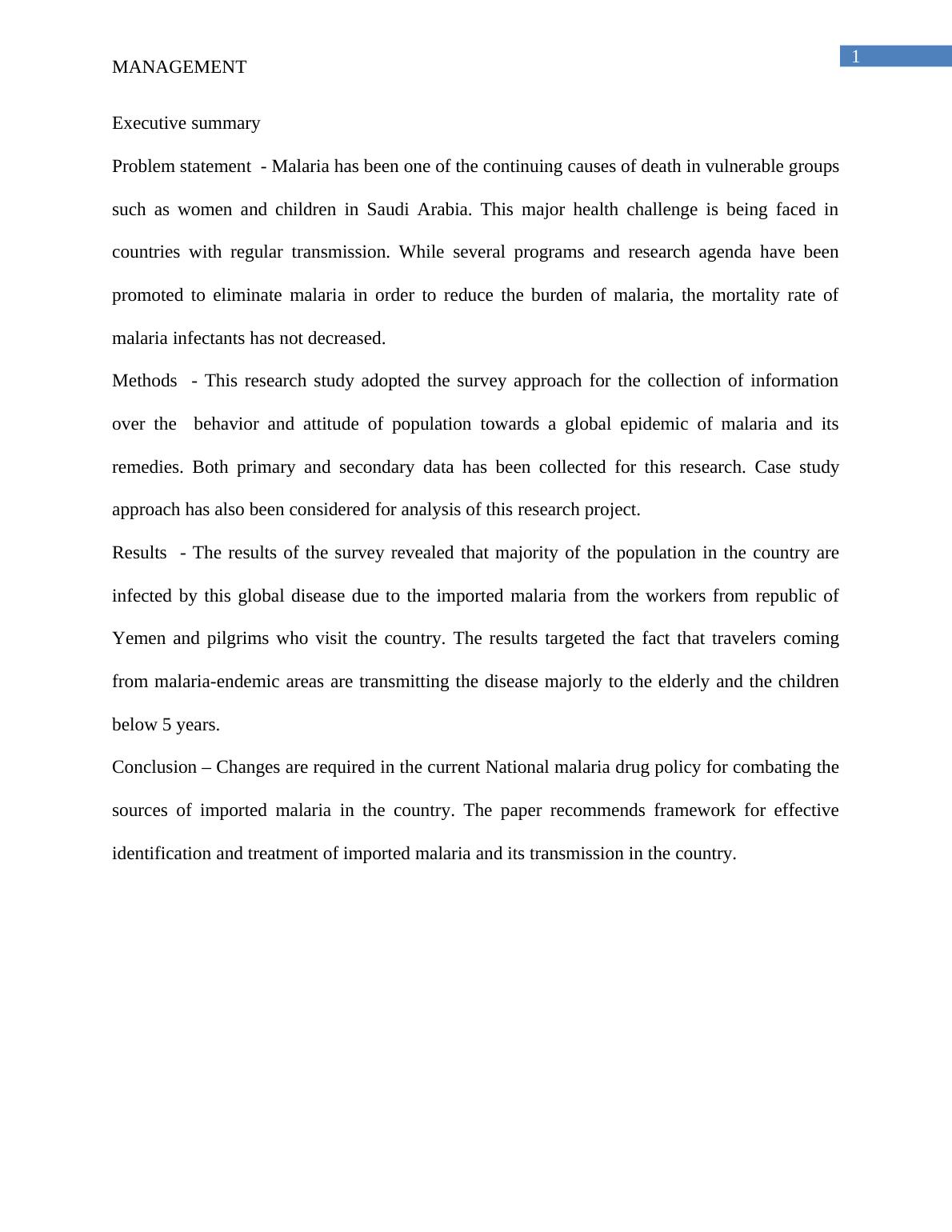
2
MANAGEMENT
Table of Contents
Introduction......................................................................................................................................3
Methodology....................................................................................................................................3
Literature Review............................................................................................................................4
Spread of the global epidemic.....................................................................................................4
Current state of national malaria drug policy..............................................................................5
Literature gap...............................................................................................................................6
Policy Context.................................................................................................................................7
Analysis of findings.........................................................................................................................8
Case Study.....................................................................................................................................13
Policy Options and recommendations...........................................................................................14
Implementation and next steps......................................................................................................14
Conclusion.....................................................................................................................................15
References......................................................................................................................................16
Appendix I.....................................................................................................................................19
Appendix II....................................................................................................................................21
Appendix III...................................................................................................................................22
MANAGEMENT
Table of Contents
Introduction......................................................................................................................................3
Methodology....................................................................................................................................3
Literature Review............................................................................................................................4
Spread of the global epidemic.....................................................................................................4
Current state of national malaria drug policy..............................................................................5
Literature gap...............................................................................................................................6
Policy Context.................................................................................................................................7
Analysis of findings.........................................................................................................................8
Case Study.....................................................................................................................................13
Policy Options and recommendations...........................................................................................14
Implementation and next steps......................................................................................................14
Conclusion.....................................................................................................................................15
References......................................................................................................................................16
Appendix I.....................................................................................................................................19
Appendix II....................................................................................................................................21
Appendix III...................................................................................................................................22
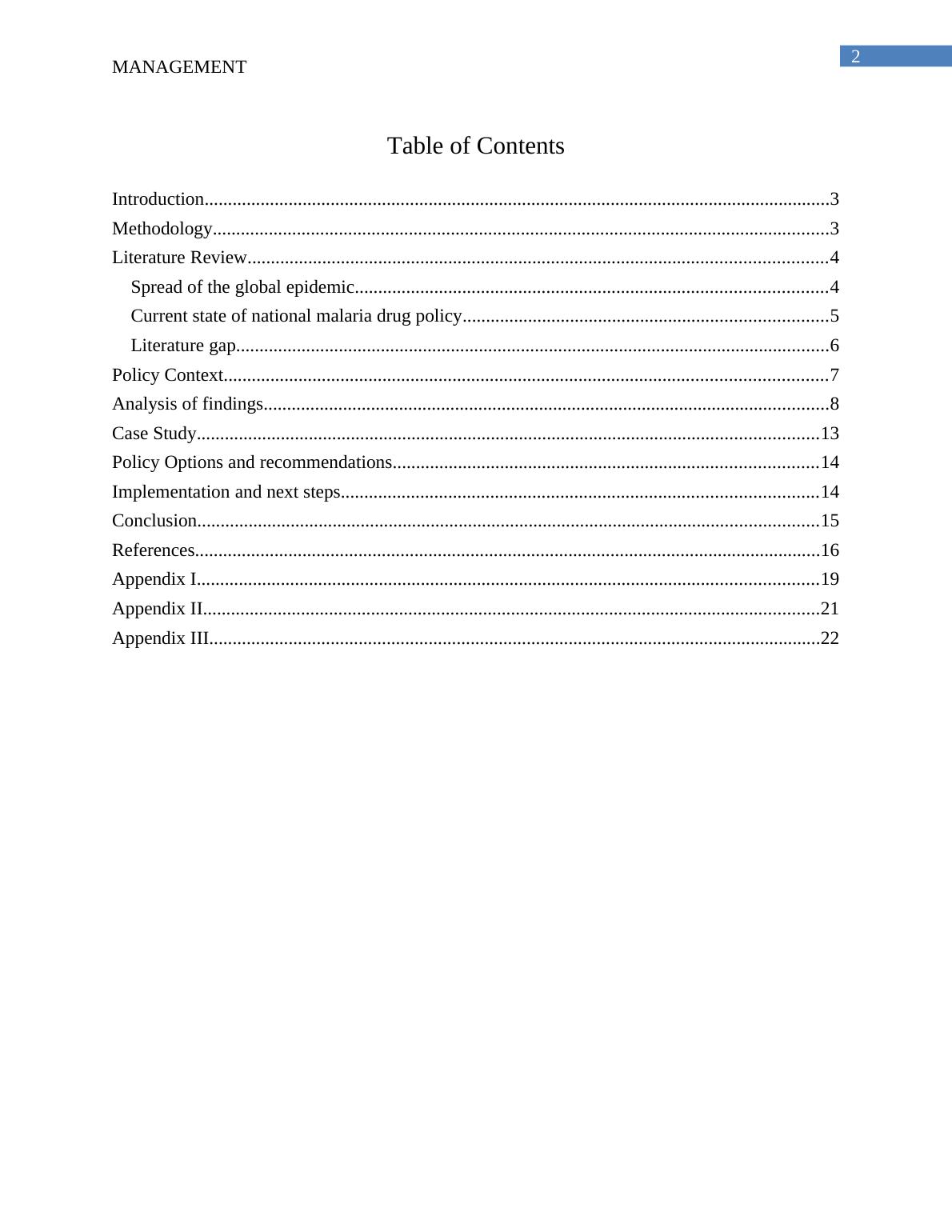
3
MANAGEMENT
Introduction
Malaria can be recognized as a global public health priority which remains the major
cause of morbidly and mortality. This disease is prevalent in several developing world, mainly
within the kingdom of Saudi Arabia affecting children’s and women of the population (Hussain
et al. 2009). According to the current investigation, the real burden of this global epidemic has
been underestimated specifically among children under the age of 5 years and older. The global
public health priority has been estimated to attribute millions of deaths in the past years within
the kingdom of Saudi Arabia. In Saudi Arabia there have been 6000 reported case of death due
to malaria in 2016 (Soliman et al., 2018). The current policy towards elimination of this global
epidemic in the kingdom of Saudi Arabia is the national malaria drug policy. The broad goals
and the underlying motivation for this paper is the development and the change of the drug
policies in the context for the elimination of the global epidemic of malaria for the improvement
of mortality rate in the kingdom of Saudi Arabia. This paper will explain the persisting issues
related to the current policy of national malaria drug and highlight theory of change which is
required for the national benefit of the country.
Methodology
The philosophy of research is used for analyzing as well as developing study of research
in detailed format. For this research study positivism philosophy has been appropriate for using
since it has helped towards investigation of the issues at a critical and logical manner. Regarding
research design, the analytical research design has been appropriate for the study for gaining the
detailed idea regarding the existing drug policy for malaria (Adeel, 2016). The researcher of this
MANAGEMENT
Introduction
Malaria can be recognized as a global public health priority which remains the major
cause of morbidly and mortality. This disease is prevalent in several developing world, mainly
within the kingdom of Saudi Arabia affecting children’s and women of the population (Hussain
et al. 2009). According to the current investigation, the real burden of this global epidemic has
been underestimated specifically among children under the age of 5 years and older. The global
public health priority has been estimated to attribute millions of deaths in the past years within
the kingdom of Saudi Arabia. In Saudi Arabia there have been 6000 reported case of death due
to malaria in 2016 (Soliman et al., 2018). The current policy towards elimination of this global
epidemic in the kingdom of Saudi Arabia is the national malaria drug policy. The broad goals
and the underlying motivation for this paper is the development and the change of the drug
policies in the context for the elimination of the global epidemic of malaria for the improvement
of mortality rate in the kingdom of Saudi Arabia. This paper will explain the persisting issues
related to the current policy of national malaria drug and highlight theory of change which is
required for the national benefit of the country.
Methodology
The philosophy of research is used for analyzing as well as developing study of research
in detailed format. For this research study positivism philosophy has been appropriate for using
since it has helped towards investigation of the issues at a critical and logical manner. Regarding
research design, the analytical research design has been appropriate for the study for gaining the
detailed idea regarding the existing drug policy for malaria (Adeel, 2016). The researcher of this
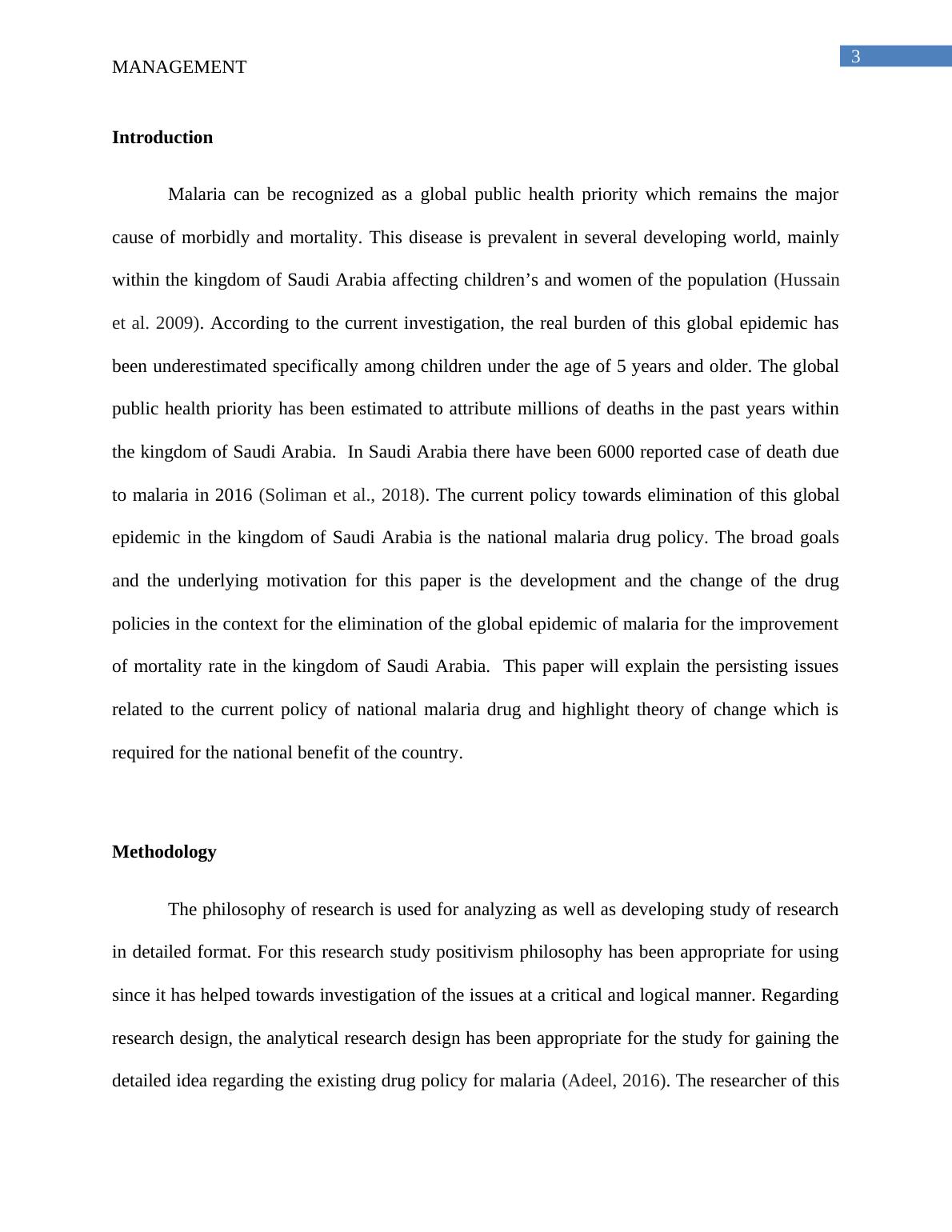
4
MANAGEMENT
study adopted survey research design for the research towards the health hazard related to
malaria and the existing drug policies within the kingdom of Saudi Arabia. According to Al-
Mekhlafi et al., (2011), survey can be denoted as a flexible research approach and hence it has
been used in this research study for investigating the response and the perspective of a wider
population towards their concept of malaria and the existing drug policy in the context of health
and social care research study. The survey research approach includes the use of surveys as well
as questionnaires.
This research study adopted the survey approach for the collection of information over
the behavior and attitude of population towards a global epidemic of malaria and its remedies.
Both primary and secondary data has been collected for this research. Case study approach has
also been considered for analysis of this research project. The sampling technique that has been
used for the collection of the data was simple random sampling for gaining a better
understanding of the current scenario of the global epidemic and the current state of the drug
policy.
This research study has approach 15 people employed in public health care centers of
Saudi Arabia. The sample size included health professionals, nurses and workers of care units.
Some of the advantages that this research has benefited by using the survey questionnaire
method includes the factors such as surveys are efficient and have both internal and external
validity. Also survey question as includes ethical advantages and is flexible towards gathering
richer data for detailed analysis.
MANAGEMENT
study adopted survey research design for the research towards the health hazard related to
malaria and the existing drug policies within the kingdom of Saudi Arabia. According to Al-
Mekhlafi et al., (2011), survey can be denoted as a flexible research approach and hence it has
been used in this research study for investigating the response and the perspective of a wider
population towards their concept of malaria and the existing drug policy in the context of health
and social care research study. The survey research approach includes the use of surveys as well
as questionnaires.
This research study adopted the survey approach for the collection of information over
the behavior and attitude of population towards a global epidemic of malaria and its remedies.
Both primary and secondary data has been collected for this research. Case study approach has
also been considered for analysis of this research project. The sampling technique that has been
used for the collection of the data was simple random sampling for gaining a better
understanding of the current scenario of the global epidemic and the current state of the drug
policy.
This research study has approach 15 people employed in public health care centers of
Saudi Arabia. The sample size included health professionals, nurses and workers of care units.
Some of the advantages that this research has benefited by using the survey questionnaire
method includes the factors such as surveys are efficient and have both internal and external
validity. Also survey question as includes ethical advantages and is flexible towards gathering
richer data for detailed analysis.
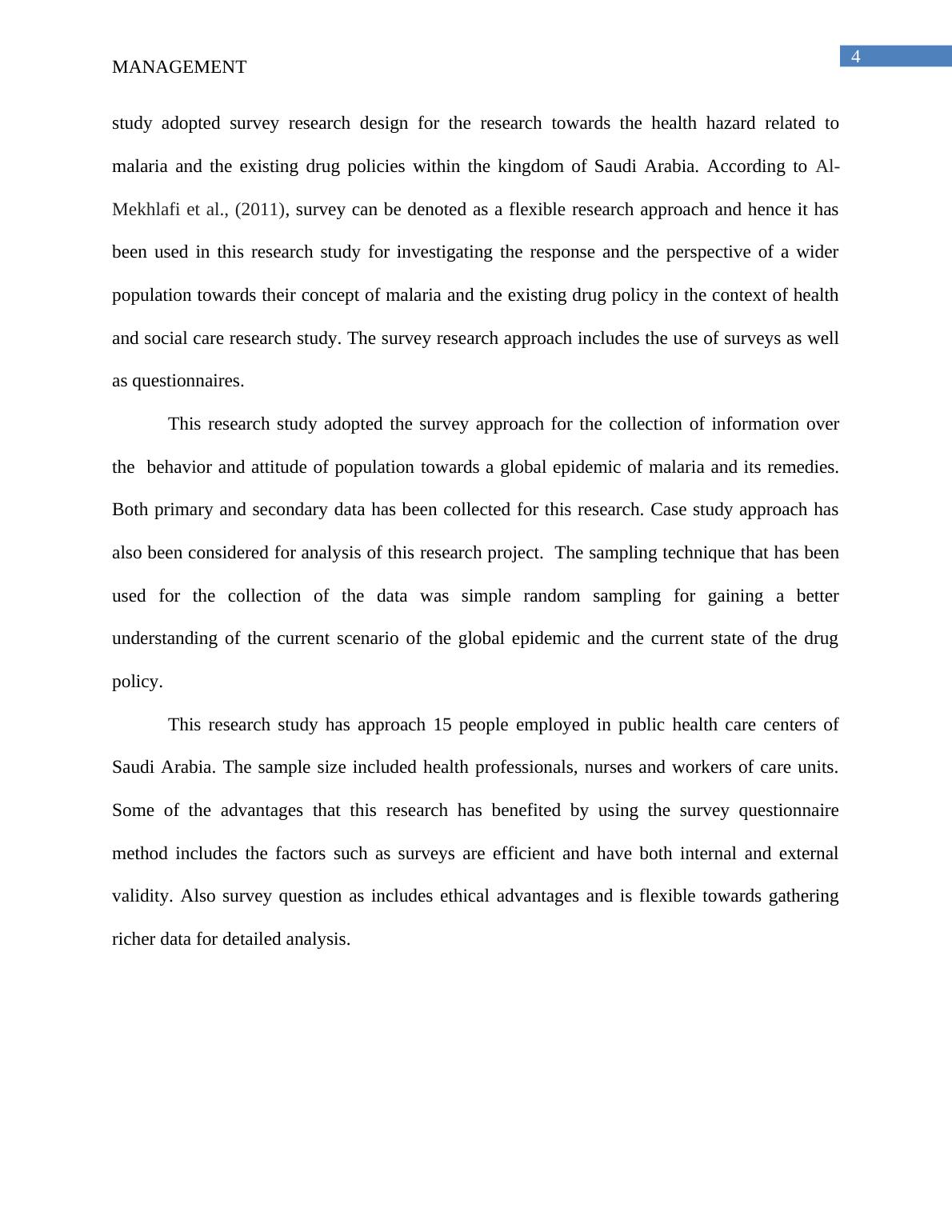
5
MANAGEMENT
Literature Review
Spread of the global epidemic
Malaria has been one of the ongoing causes of death affecting vulnerable groups like
women and children in Saudi Arabia. This major health challenge is encountered in countries
having regular transmission. The peninsula of Arab stretches out towards the fringes of malaria
endemicity where the transmission of this global health issue has undergone several stages of
reduction together with consequences of rapid vector control implementation. According to
Coleman et al., (2014) , the elimination of this disease was established by buy the development
of systematic control program and policies based on enhanced surveillance, dynamic is detection
and vector control. However several parts of Saudi Arabia remains unaffected and continuous to
face challenges due to malaria for the lack of proper implementation of these developments.
According to the health researches by World Health Organization. (2016), the country showed a
rise in death cases from the year 2015 to 2017 with 5000 imported cases of death due to malaria.
It is found that plasmodium falciparum account for the majority of cases related to indigenous
malaria .
Current state of national malaria drug policy
The current drug policy is based over the practical challenges for meeting the following
objectives. The national drug policy of Saudi Arabia aims to prevent the complications and the
cure of infection resulting from malaria and mosquito bites. The major goal of this drug policy
includes prevention or delay of the emergence and spread of resistance to antimalarial drugs El
(Hassan et al., 2015). It further more aims to interrupt over the transmission in endemic areas of
Saudi Arabia as well as prevention of the resumption related to the transmission to the areas
MANAGEMENT
Literature Review
Spread of the global epidemic
Malaria has been one of the ongoing causes of death affecting vulnerable groups like
women and children in Saudi Arabia. This major health challenge is encountered in countries
having regular transmission. The peninsula of Arab stretches out towards the fringes of malaria
endemicity where the transmission of this global health issue has undergone several stages of
reduction together with consequences of rapid vector control implementation. According to
Coleman et al., (2014) , the elimination of this disease was established by buy the development
of systematic control program and policies based on enhanced surveillance, dynamic is detection
and vector control. However several parts of Saudi Arabia remains unaffected and continuous to
face challenges due to malaria for the lack of proper implementation of these developments.
According to the health researches by World Health Organization. (2016), the country showed a
rise in death cases from the year 2015 to 2017 with 5000 imported cases of death due to malaria.
It is found that plasmodium falciparum account for the majority of cases related to indigenous
malaria .
Current state of national malaria drug policy
The current drug policy is based over the practical challenges for meeting the following
objectives. The national drug policy of Saudi Arabia aims to prevent the complications and the
cure of infection resulting from malaria and mosquito bites. The major goal of this drug policy
includes prevention or delay of the emergence and spread of resistance to antimalarial drugs El
(Hassan et al., 2015). It further more aims to interrupt over the transmission in endemic areas of
Saudi Arabia as well as prevention of the resumption related to the transmission to the areas
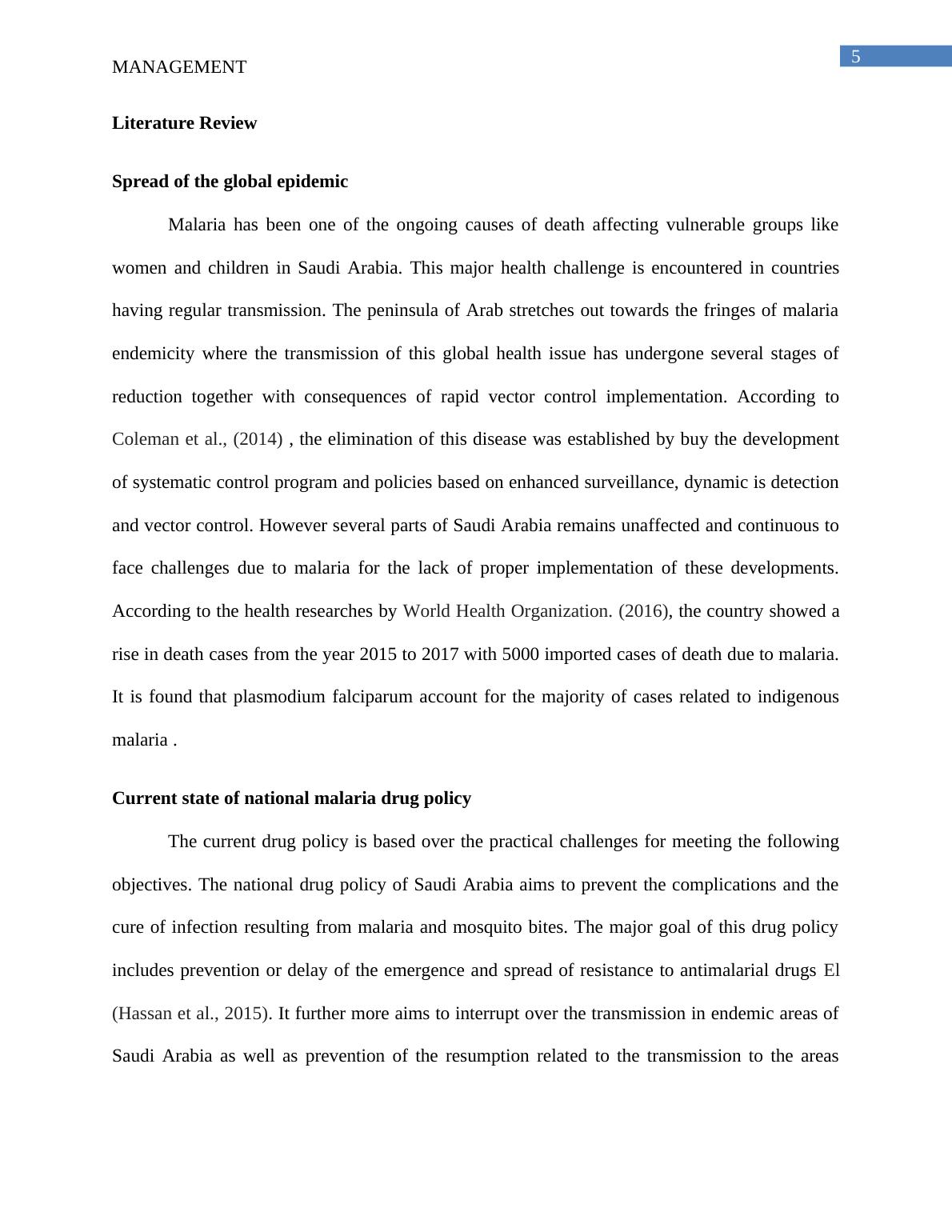
End of preview
Want to access all the pages? Upload your documents or become a member.
Related Documents
Epidemiology of Malaria in Saudi Arabialg...
|5
|894
|405
Current Global Health Issue in Saudi Arabialg...
|8
|1665
|117
Evaluation of Public Health Approaches in India and USA for Malaria Eradicationlg...
|26
|2332
|45
Malaria in Africa: A systematic Review of its Environmental Determinantslg...
|10
|2679
|59
Effects of Malaria in Developing Countrieslg...
|6
|1089
|237
Burden of Diseases in Saudi Arabia: Strategies and Challengeslg...
|4
|864
|103
